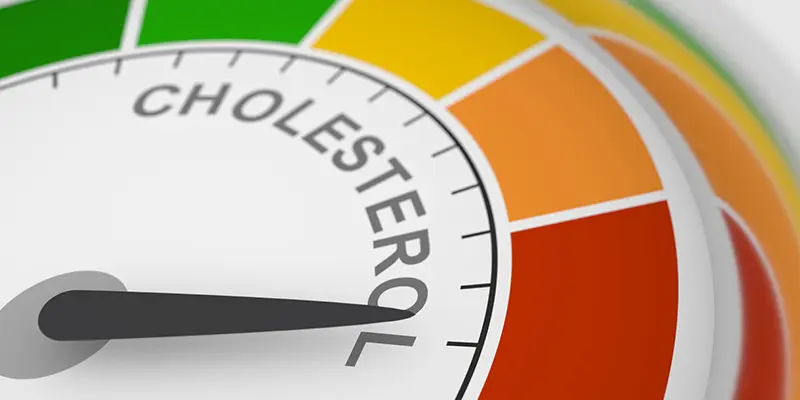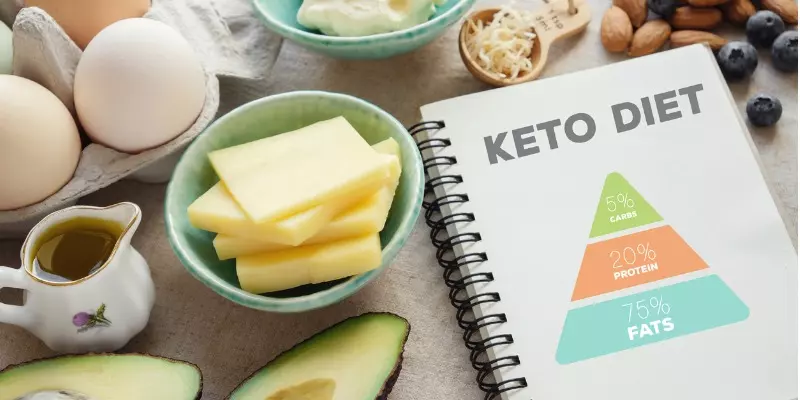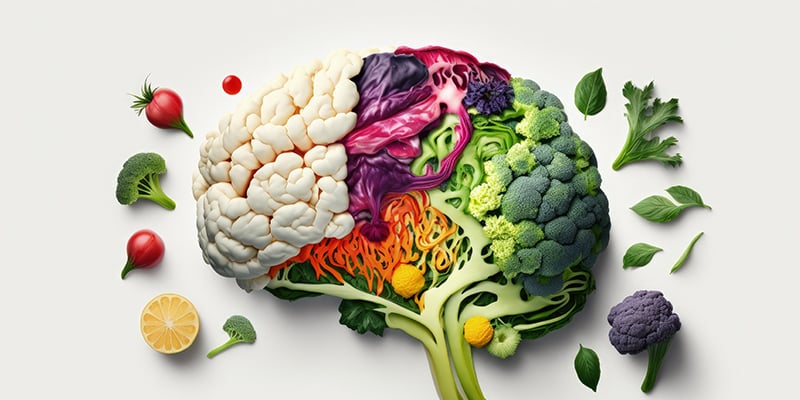
Cholesterol has been demonized. For decades, we’ve been hearing about “bad cholesterol” and how it’s related to heart disease. The medical community’s directive to lower cholesterol has been so strong that more than 1 in 4 American adults over the age of 40 take cholesterol-lowering statins. One of the most commonly prescribed drugs in America, statins are a $31 billion business. It’s as if our nation has become obsessed with pushing levels down in an effort to protect heart health. But they’ve got it all wrong.
“Cholesterol is a poor predictor for heart disease,” says Dr. Jonny Bowden, a board-certified nutritionist known as the Nutrition Myth Buster and author of The Great Cholesterol Myth (with Steve Sinatra, MD), which has a new revised and expanded edition. Dr. Bowden recently appeared on the Brain Warrior’s Way podcast to bust some cholesterol myths.
What traditional doctors don’t tell you is that low levels of cholesterol can have negative effects on the brain. “Your brain without cholesterol? You’re dead,” says Dr. Bowden. “It’s one of the most important compounds in the body, and it’s involved in memory and thinking and much more.”
Mythbuster: What traditional doctors don’t tell you is low levels of cholesterol can have negative effects on the brain. Click To TweetWHY YOUR BRAIN NEEDS CHOLESTEROL
Do you know which part of the body has the highest concentration of cholesterol? Your brain! Cholesterol is a waxy type of fat found in every cell in the body, but it is most abundant in the brain. Your brain accounts for only 2% of your body’s weight, but it contains 20% of your cholesterol.
Why is cholesterol so important? Cholesterol in the brain is involved in the communication process for neurotransmitters, such as dopamine and serotonin. It makes up the majority of myelin, the white fatty sheath that provides a protective coating on neurons to increase the brain’s processing speed. And they play a role in the development of “lipid rafts,” membranes that are involved in brain cell signaling.
Bottom line? Approximately 60% of the solid weight of the brain is fat, so you need healthy levels of cholesterol for optimal function.
THE CHOLESTEROL-HORMONE-MENTAL HEALTH CONNECTION
In addition, cholesterol is a critical building block for the production of hormones. From cholesterol, your body makes a chemical called pregnenolone, a mother hormone, from which all the other hormones are derived. Hormones play a vital role in the health of your brain and how you think, feel, and act. If your cholesterol is too low, you won’t have the precursors to produce adequate levels of hormones. Hormonal deficiencies are linked to a number of psychiatric and cognitive health symptoms, including:
- Estrogen—Low levels of estrogen are linked to depression, fatigue, brain fog, memory loss, and focus problems.
- Progesterone—Common symptoms of low progesterone include anxiety, depression, and trouble sleeping.
- Testosterone—Symptoms of low testosterone levels include depression, anxiety, difficulty concentrating, and lack of motivation.
- Thyroid—Thyroid deficiencies can create depression, attentional problems, memory problems, and fatigue.
- DHEA—Falling levels of DHEA have been linked to depression, fatigue, and mental fog.
- Vitamin D—Low levels of this vitamin (which is actually a hormone) have been implicated in depression, bipolar disorder, and memory problems, including Alzheimer’s disease.
HOW LOW IS TOO LOW?
Cholesterol that is too low is bad for the brain. What’s considered normal? Normal total cholesterol levels are 135-200 mg/dL. However, be aware that several studies show that lowering total cholesterol levels below 160 mg/dL can increase the risk of depression, suicide, and homicide, so 160-200 mg/dL is optimal. Don’t go too low.
Surprisingly, if you have cholesterol on the higher side of the healthy range later in life it could improve your cognitive performance, according to research in Psychosomatic Medicine. In fact, findings in the journal Neurology show that having higher levels of total cholesterol later in life decreases your risk of dementia.
According to Dr. Bowden, the typical cholesterol tests that simply measure total cholesterol, HDL, LDL, and triglycerides are obsolete, and they’re missing the most important numbers that matter for heart health. “What’s important to understand is that cholesterol doesn’t travel in the blood. Cholesterol has to be in a container,” he says. “Those containers are the lipoprotein. Lipoprotein is the ship; cholesterol is the cargo. It’s the number of boats in the water that’s important, not the cargo.”
When having your cholesterol levels tested, ask your healthcare professional to also test your lipoproteins and the particle size of your LDL cholesterol because larger particles are less toxic than smaller ones. If you want to find out more about cholesterol, read the revised and expanded editions of The Great Cholesterol Myth.
WHAT TO FEED YOUR BRAIN
Low-fat diets are not good for your brain. Focus on healthy fats, such as avocados, nuts, seeds, and sustainable, clean fish. Fat is not the enemy. Good dietary fats are essential to your brain health. For example, omega-3 fatty acids have been found to reduce symptoms of depression.
In a study from the Mayo Clinic, people who ate a fat-based diet had a 42% lower risk of developing Alzheimer’s disease; those who ate a protein-based diet had a 21% percent lower risk of developing Alzheimer’s; but those who ate a simple carbohydrate-based diet (think bread, pasta, potatoes, rice, and sugar) had a 400% percent increased risk of developing Alzheimer’s. It’s the sugar, and foods that turn to sugar, not the fat, that’s the problem.
However, not all fats are equal. Avoid trans fats (found in foods like processed crackers, baked goods, and frozen pizza), which are associated with an increase in depression. Also skip fats that are higher in omega-6 fatty acids, such as many refined vegetable oils, which are associated with an increase in inflammation, which also has negative effects on brain health.
Memory problems, brain fog, depression, and other mental and cognitive health issues can’t wait. During these uncertain times, your mental well-being is more important than ever and waiting until life gets back to “normal” is likely to make your symptoms worsen over time.
At Amen Clinics, we’re here for you. We offer in-clinic brain scanning and appointments, as well as mental telehealth, remote clinical evaluations, and video therapy for adults, children, and couples. Find out more by speaking to a specialist today at 888-288-9834. If all our specialists are busy helping others, you can also schedule a time to talk.





Thanks for the article.
The only reason for the unwavering pressure to lower cholesterol is the statin industry. Statins represent an almost perfect drug scam. So many people are convinced that their cholesterol is bad, that selling people on taking the drugs is a walk in the park. Additionally, if administered with care, the number of people permanently injured and killed by statins is relatively low.
Comment by Leaf Expert — November 6, 2020 @ 1:17 AM
100% correct! As a Dr and PhD in Integrative Medicine, I make a point of explaining this to all my clients. This cholesterol myth is a load of nonsense, and statins, the “slow death drugs” aught to be banished. They are downright dangerous. ! Shame on the doctors who prescribe them.
Comment by Irene James — November 6, 2020 @ 3:13 AM
Incredible information. Thank you for sharing this. So very critically important.
Can you get this to your facebook page so it can be shared?
Comment by Buddy Ross — November 6, 2020 @ 3:26 AM
I love this article. The results from the mayo clinic show how crucial it is to have healthy fats in our diet for the long term health of our brain. Sally the western diet is still mostly carbs and we look down upon fats in general, and we think cholesterol is the devil period without any context. This year I’ve been lucky enough to learn about the good fats and change my diet and health. Thanks to doctors like you we are having a change of mindset.
Comment by Frank Costelloe — November 6, 2020 @ 4:16 AM
I thought this was a very interesting article. Without meds I got my cholesterol down to 165 and now I have to be concerned if it goes below 160. Super interesting article
Comment by Donna Frank — November 6, 2020 @ 4:43 AM
I sent my son to Amen Clinic in Orange County several years ago. Unfortunately he wanted to take his girlfriend with him so I don’t go. It turned out to be disastrous so the work and follow up never happened. I’d hate to think it was a total waste! Can he follow up with you and get some help? He lives alone and sleeps most of the day. He sleeps to avoid evil entities. He takes no meds. Please help!!
Comment by Viola Montoya — November 6, 2020 @ 5:31 AM
Thank you for the article on cholesterol. I have been fighting my doctor to stay off of Cholesterol medication. I am in the middle on chart, but I am over weight since surgery in 2018. I am 63 years old and have to take vitamin D and zyrtec for allergies that is all I am on. Don’t take anything for ankle pain.
Comment by Pamela Willard — November 6, 2020 @ 6:43 AM
This matches up with my experiences. When I first started taking antidepressants (Prozac in the 1990s) my mood improved, but my cholesterol shot way up (over 300 total). So my doctor prescribed Lipitor to bring that number down. As my cholesterol declined, so did my mood, so I stopped taking the Lipitor and focused on my diet. At several subsequent stages of life, a change in depression medication resulted in higher cholesterol, a statin was prescribed, and my mood went way down. The last few times my doctor mentioned cholesterol being high, I told him or her that I will not take a statin ever again. I’d rather take my chances with slightly high (225) cholesterol than suicidal depression.
Comment by Andre Nauta — November 6, 2020 @ 7:48 AM
Hello Buddy, thank you! Yes, you can see the post on our social media (https://www.facebook.com/AmenClinic/) and share!
Comment by Amen Clinics — November 6, 2020 @ 8:10 AM
Very good article! However, I didn’t see any information on what to do if you have LOW cholesterol?
There are no meds that I know of, only dietary influence. So, as one who has very low cholesterol, always 70-100 and never above 100, what does one do?
Comment by John Etcheverry — November 6, 2020 @ 10:24 AM
I am very excited to read this article! My cholesterol has been 138 for over a year by taking 10 mg of Simvastatin daily. As I suffer from many of the effects of low cholesterol mentioned in this article I will speak to my Doctor about reducing or eliminating the Simvastatin.
Comment by Fred — November 6, 2020 @ 11:34 AM
This may be the reason why I feel better when I occasionally eat meat.
Comment by Chris Mentzel — November 6, 2020 @ 12:06 PM
The article mentions refined vegetable oils high in Omega 6 fatty acids as bad. Does that include extra virgin, first cold pressed olive oil?
Comment by Rob Field — November 8, 2020 @ 1:59 PM
My problem is I don’t think I eat a low fat diet, and I don’t think I eat a high fat diet either; however, I still have a level of triglycerides which they are saying are off the charts. What can I do to lower my triglycerides?
Comment by Annie Lopez — November 11, 2020 @ 12:47 PM
My sister in law has been preaching to me forever about the danger of statins. After reading this page, I made appt with my dr to discuss this. I stopped taking the rusovastatin 2 days ago & my appt is in 4 days.
Comment by Sandra Lal — December 18, 2021 @ 12:41 PM
I wish all the doctors would get on the same page..
I have a new doctor and he wants me to go in cholesterol meds(not statins)..but the side effects are not something I want to deal with..
It's no wonder all of the dementia in nursing homes..I'm sure they are on statins..
Thanks for the article
Comment by Dianna — February 10, 2023 @ 10:58 AM